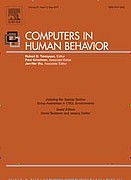Can Facebook use become compulsive? What factors promote addictive usage patterns? [15.08.14]
Philipp Masur (University of Hohenheim), Leonard Reinecke, Marc Ziegele and Oliver Quiring (University of Mainz) published a study on social network site addiction in the journal "Computers in Human Behavior".The paper aims at exploring the new phenomenon of social network site (SNS) addiction and at identifying predictors of problematic SNS use. For this purpose, a scale measuring addictive behavior specifically with regard to SNS use was developed. The effects of intrinsic need satisfaction in the offline context and of SNS-specific motives on SNS addiction were tested in an online-survey among 581 SNS users in Germany. It was hypothesized that motives mediate the influence of thwarted intrinsic need satisfaction on addictive behavior on SNSs. More precisely, we assumed that a lack of autonomy leads to a higher motivation to use SNSs for self-presentation and escapism, a lack of competence predicts the motive to use SNSs for acquiring information and self-presentation, and a lack of relatedness fosters users' motives to use SNSs for self-presentation and meeting new people. These motives, in turn, were predicted to be associated with higher levels of SNS addiction. All proposed mediation models were supported by the data.
The results emphasize the importance of incorporating both offline need satisfaction and gratifications sought through the use of SNS to provide a comprehensive perspective on addictive behavior on SNSs.
Masur, P. K., Reinecke, L., Ziegele, M. & Quiring, O. (2014). The interplay of intrinsic need satisfaction and Facebook specific motives in explaining addictive behavior on Facebook. Computers in Human Behavior, 39, 376-386. doi:10.1016/j.chb.2014.05.047


